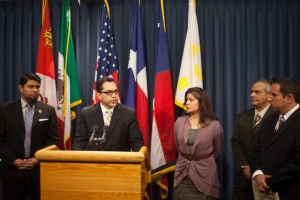Latino Voices Sidelined in Texas School Reform Debate
 Outside the Senate chamber Tuesday afternoon, advocates for minority students laid out their priorities for public education this session—and wondered why so few Latino experts have been invited to help shape this session’s biggest school reform bills.
Outside the Senate chamber Tuesday afternoon, advocates for minority students laid out their priorities for public education this session—and wondered why so few Latino experts have been invited to help shape this session’s biggest school reform bills.The press conference, heralding a new Latino Coalition for Educational Equality, fell midway through a long day of hearings on bills that would scale back school testing and rework Texas’ graduation plans. Texas HOPE director Joey Cardenas worried that lawmakers are sidelining Latino voices as they rush ahead with those plans.
“I’m just amazed by the lack of participation of Latino experts in the process,” said Cardenas. “I think you’re leaving a significant part of the equation out.”
He said it’s time lawmakers include Latino leaders “not as an afterthought, but as decision-makers in that process.”
MALDEF attorney Luis Figueroa chimed in that there are, for instance, no Latino members on the House Appropriations subcommittee that handles public school funding.
As the fastest-growing demographic in Texas schools, Figueroa said, Latino students need a system that serves their needs—including schools that are better funded, measured by more than test scores, and support students still learning English. He said Latino students need schools that put them on a track to college, and keep
